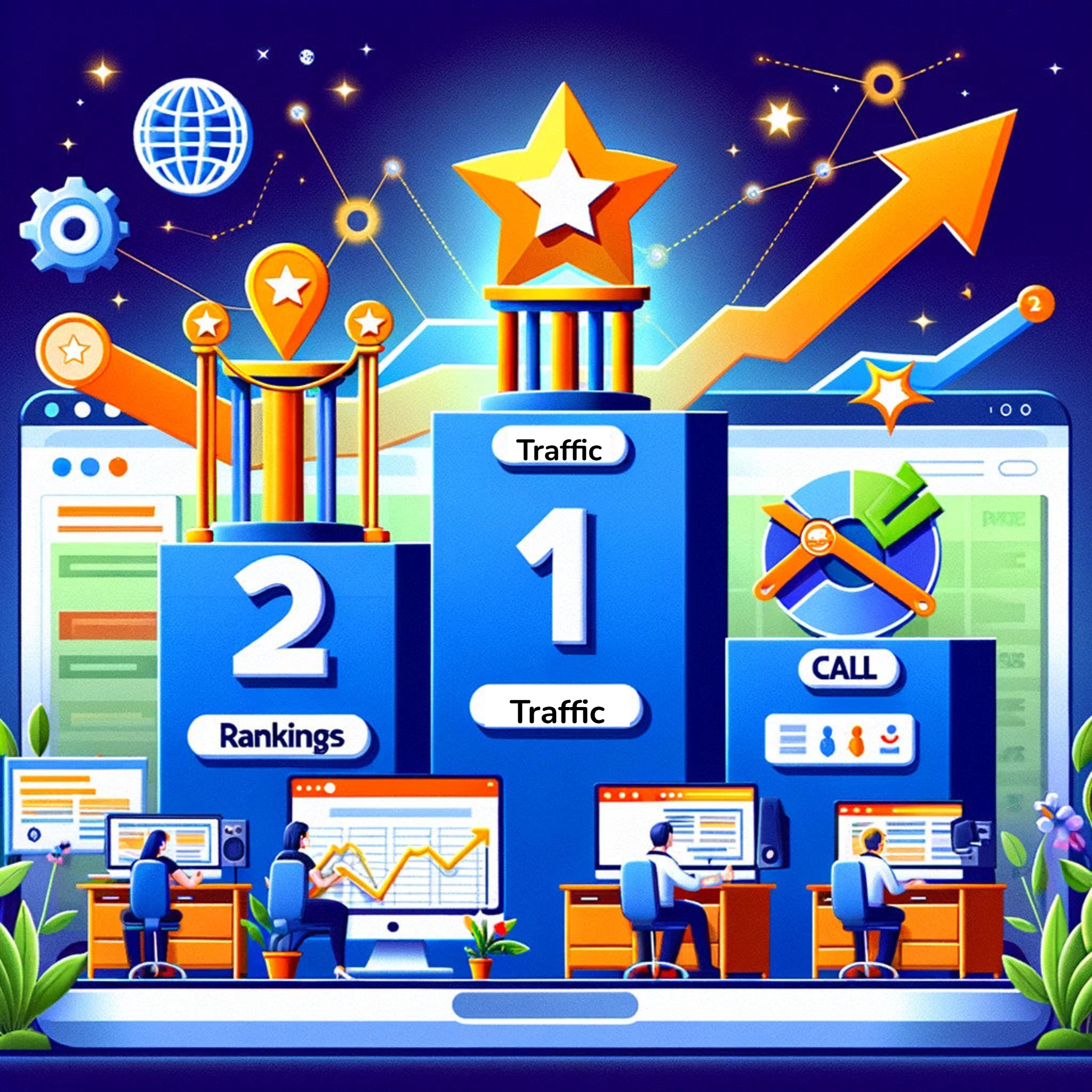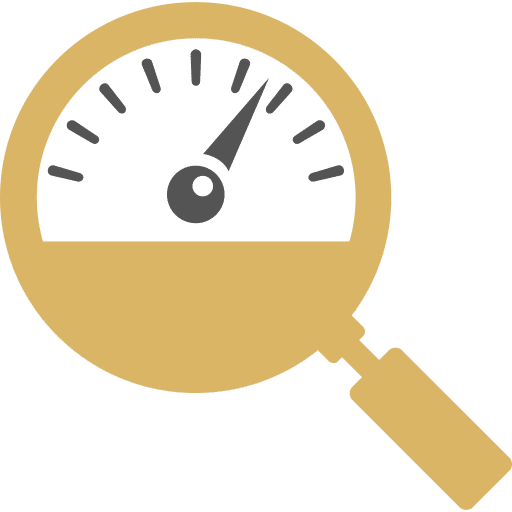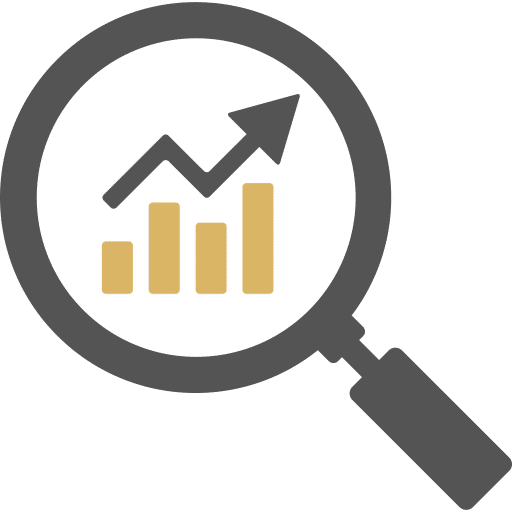Unlocking SEO Success:
3 Key Metrics to Measure Your Agency's Performance
Have you hired an SEO agency and wondered if they’re actually doing anything?
A key question to ask is, are they “showing” their work?
As an agency owner, I’ve had to grapple with the challenge of showing our clients the intricate details of what we do behind the scenes. But regardless of the level of understanding you have about the processes behind the curtain, there are three vital signs to watch for.
If you’re not seeing the following three metrics… Something might be off!
Simplifying SEO With an Analogy

Before we get into the three metrics that prove your SEO agency is on the right track let’s grasp the basics of SEO.
There’s a wealth of detailed articles out there that go into the intricacies of SEO. (we also made a crack at explaining the basics of SEO)
But for this article, I want to give you an analogy to simplify the concept. (like all analogies, they aren’t perfect and will fall apart at some point of scrutiny)
Imagine that you’re planning a big, exciting party. Your house (website) is where the party will be. You want lots of people (web users) to come to your party, but first, they need to find your house. The better your house’s location (search engine ranking), the easier it is for people to find it, and the more likely they are to come to your party.
Here’s how it all plays out:
An SEO Agency is like the party planner: The job of a party planner (SEO agency) is to make your party (website) as appealing and as easy to find as possible. They do this by sending out stylish invitations (metadata), working on getting recommendations/endorsements (backlinks), putting up clear signs (keywords) leading to your house, and planning exciting activities (content) to attract guests.
Keywords are like road signs: Road signs guide guests to your house. Similarly, keywords guide users to your website. The right road signs (keywords) placed at important junctions (search engine queries) will lead lots of guests (users) to your party (website).
Content is the house and the party’s main event: It’s the food, the music, the entertainment – the reason people decide to stay at your party rather than go somewhere else. Similarly, good content is the reason visitors know they’re in the right place.
Backlinks are word-of-mouth recommendations: When your friends (other websites) tell people about your fantastic party (website), those people are likely to come. In the world of SEO, this is like having other reputable websites link to yours, effectively recommending your site to their visitors.
Website’s design is the party layout: A party with a confusing layout can frustrate your guests. Similarly, if your website is hard to navigate, people won’t stay long. That’s why your website’s design needs to be user-friendly, just like a good party layout.
So in essence, SEO is like throwing a fabulous party on the internet where you want as many people as possible to show up and have a good time!
Importance of hiring an SEO agency
There is a lot to know about SEO and the information can be overwhelming. That’s why companies and businesses hire agencies for their expertise so that they can focus on helping their clients/customers.
You need to hire an expert that has a proven track record because SEO is not a one-size-fits-all solution
It’s like cracking a code or solving a puzzle especially because Google keeps changing the rules. The benefit of hiring an SEO company is that you get a team of people that can see what’s working currently and if they figure out something successful for a different client they can start implementing it on your website too.
Unlocking the Secret: How Do You Measure Your Agency's Performance?
So it’s important to hire an SEO Agency but how do you know they’re doing their job?
There are really three metrics you look at while they’re working away behind the scenes.
- Rankings
- Traffic
- Phone Calls and Leads
That’s all you have to look at, I’ll explain more below:
I. Rankings in Google
Now, I’m going to assume that keyword research was done at the start of the campaign because there’s a difference between ranking for longtail keywords that no one searches for like “AC installation and repair in Vancouver BC Canada for residential homeowner” vs “AC installation Vancouver”.
Where you rank currently on the search engines is the first thing we look at because the first thing that’s going to indicate if we’re moving in the right direction.
What was your ranking position when you started, and are you starting to see more volatility after one month? Some projects will see a pretty big jump within the first month or two but regardless, the rankings should start to move upwards.
Let’s face it, even if you jump from ranking #100 on the 10th page to ranking #12 on the 2nd page, you’re still unlikely to see significant traffic to your website because people rarely click on anything past the first page of Google.
Here’s an example of a client that wasn’t ranking at all when we first started with them.

You can see from this example that the movement in rankings should be seen within the first 3 months. When the keywords get to the 2nd page of Google, it’s a little slower of a move because Google is now paying more attention and doing more quality control. It takes about 9 months to get to the #1 position whereas it took only 3 months to get to the first page of Google. (Typically a website takes 8-12 months to rank and start getting traffic, This website was on the faster side for getting results)
II. Traffic to Your Site
The second metric we look at is the traffic to your website.
You should have access to your Google Analytics 4 or Google Search Console to see your traffic, where it comes from, and how it’s engaging your website. If your rankings are increasing you should see 2 things in Search Console. The impressions and the traffic/clicks should be increasing.
III. Leads From Your Site
This leads right into our third metric: generating leads and phone calls.
If there’s a significant improvement in the traffic because the right people are finding you on Google then what you’ll start to experience is an increase in Leads. This usually comes in the form of more calls or more website contact forms filled out.
Conclusion
Understanding these three metrics is vital for your business because, ultimately, you want to grow your revenue and increase your profits. Paying attention to these metrics allows us to identify any problems and resolve them. For instance, let’s say your website ranks among the top three positions for valuable keywords and receives substantial traffic from Google, but you’re not getting any increase in leads/calls/emails, etc. This discrepancy tells us there’s a potential issue with conversion on your site. In this case, we would examine the website’s design or layout to identify what might be preventing visitors from reaching out.
If you are struggling to gain any traction in Google feel free to reach out to us and get a free SEO analysis by one of our experts!
More SEO information













